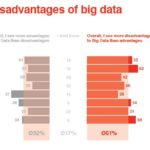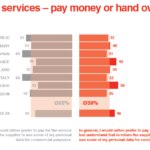Big Data: Europeans trust banks more than search engines or social media
Only 26% believe that organizations and businesses comply with personal data protection regulations, according to Vodafone Institute's report, presented during the 'Big Data: Limitless opportunities?' forum, co-organized by El País and Data Pop Alliance. Although in general terms, Europeans are wary about how organizations use their personal information, 36% of respondents said they trusted banks, compared to the 16% and 11% that said they trust search engines or social networks, respectively.

When it comes to use of personal data, Europeans are inconsistent. We are jealous of our privacy, which makes us mistrust big data, but our online behavior does not reflect this wariness.
On the one hand, we do not trust how companies handle our data, but we don’t bother to get more information in this regard. Only 26% think that organizations respect the privacy of their personal data, according to TNS’ analysis for the Vodafone Institute for Society and Communications.
We don’t know who we have given access to our personal data or under what circumstances. Only 20% know where and who collects and stores their personal data and only 12% say they read the terms and conditions for the apps or services they use. 40% admit to accepting the terms and conditions without reading them.
We give access to our data even though we have little trust in public or private organizations regarding how they treat our personal information.
Opportunities and Risks of Big Data- Vodafone Institue
The organizations that have higher levels of trust include service providers (43%), the companies where we work (36%) and banks (36%).
On the opposite end of the spectrum are search engines, with only 16% of the survey respondents’ trust and social networks with 11%. This has not prevented Facebook from having more than 1.6 billion friends or Google from acumulating 1 billion Gmail accounts, for example.

“There are huge contradictions between citizens’ opinions and how they act. Companies need to be clearer when explaining how they user customers’ data, but there is also a need to train and educate citizens on data,“ notes Marco Bressan, BBVA Chief Data Scientist, who participated in the conference where the study was presented.
Clear and simple
The lack of clarity in terms and conditions leads Europeans to look for information on how their data is treated in the media. 34% find out what happens to their data in the news and 30% online.
But citizens have a clear demand in this regard: most want more transparency. 68% of Europeans think that simple and clear language should be used, with shorter terms and conditions so they can understand them. 74% of users in Spain agree.
64% want more transparency on how data is collected and how it will be used and 56% asks organizations to avoid the fine print.
Data in exchange for services
On the other hand, a large part of the population understands that allowing access to their data is the way to compensate companies that provide them free services. At least 48% sees it this way. In Spain, 60% of users agree with this exchange, although it seems like a forced agreement since citizens would use other options if they had them.
This can be deduced from the fact that 55% of survey respondents would prefer to pay for a service than allow a provider to use some of their personal data for commercial purposes. Spain stands out in this aspect of the survey, with 66% of Spaniards willing to pay to protect their privacy.

A justified purpose
But when Europeans are asked about the use of their data in specific apps, there is a radical change of perspective. Citizens are willing to give up a little of their privacy when it’s for the common good or for a differential advantage.
53% of Europeans say they don’t mind their data being openly used if it helps improve their health or the health of others. 68% are in favor of installing data monitors in residential buildings to obtain more environmentally friendly heating systems. 55% would allow their cars to be tracked so navigation systems can provide them personalized advice on traffic.
Spain, more relaxed
The study highlights that Spaniards are more relaxed when it comes to the use of their data, while Germans are the most concerned by the privacy and treatment of their data.
“A debate is needed about how users should be able to limit the use of their data,” concludes Bressan, agreeing that the Vodafone Institute study is eye-opening regarding an issue that is essential to continue making progress in big data technologies. Citizens need clearer information about how and why their data is being used as well as new tools to monitor the use of their data.